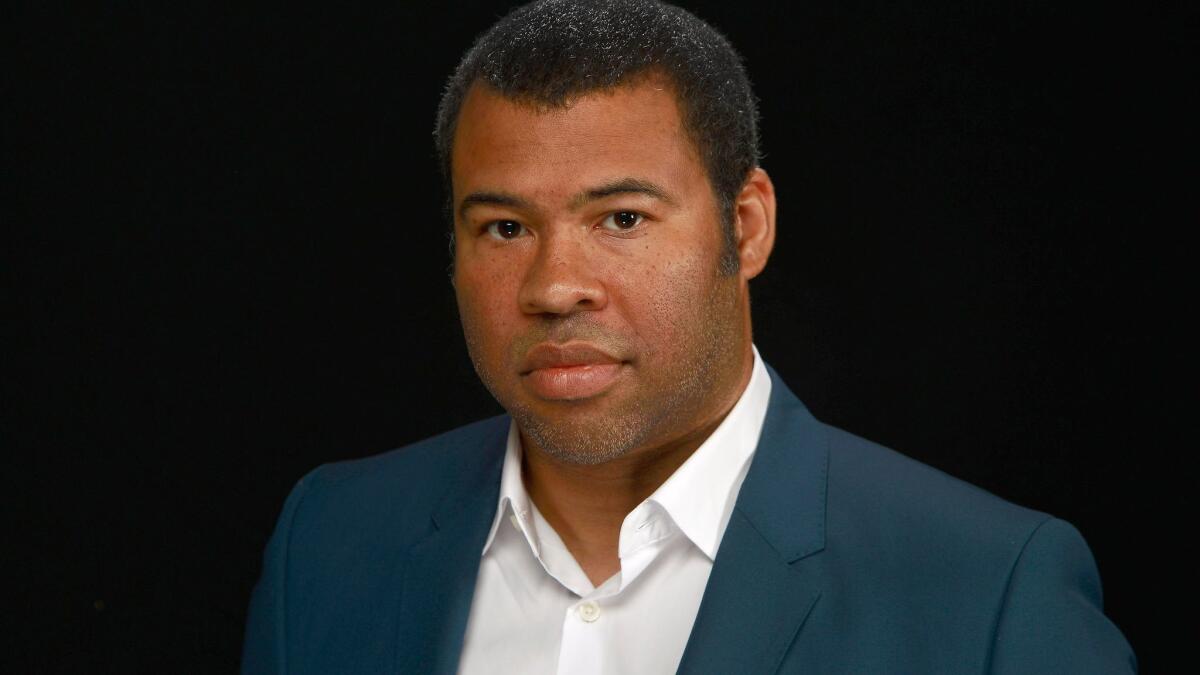Out of the sunken place, into the Oscars race: The emotional journey of Jordan Peele’s ‘Get Out’

When Jordan Peele got the news that the biggest gamble of his career had just earned four major Academy Award nominations, including best picture, best director and best original screenplay, he got on the phone with his “Get Out” star, Daniel Kaluuya — and broke down in tears.
“It was very emotional,” said Peele, the comedian-turned-director who made his directorial debut with the race-themed social thriller, made for a modest $4.5 million, about a young African American man (Kaluuya) who goes to meet his white girlfriend’s family only to find himself trapped in a sinister nightmare.
“Whenever I talk to him about this stuff, I just break down,” Peele said Tuesday morning. “We both went from knowing we were taking this huge risk and that we could very well be hated for the risk, to being here and getting the acknowledgment of our peers — peers who, by the way, we didn’t even feel like we could call our peers a year ago.”
LIVE UPDATES: Oscar nominations 2018 »
Peele’s nods launch him into the annals of Oscars history with poignant distinction: He is only the fifth black filmmaker in 90 years to be nominated for directing. And he’s the third first-time filmmaker to hit the nominations trifecta — picture, director and screenplay — all at once.
The academy honors remind Peele that he had once sidelined his aspirations of directing because of how improbable they seemed.
“I left my dream of being a director behind long ago, and I think that was because, while I have a great respect for film, I didn’t really believe there was a place for very many black directors,” Peele said. “I thought it would be harder for me as a person of color to convince someone to let me use their money to make a movie.”
“Many years later I came back to my original dream,” he continued. “And the fact that it’s been received the way it has been received teaches me a lot about how I internalized the system.”
“It’s his heart, man,” said an elated Kaluuya, who got the news of his lead actor nomination, a career first for the 28-year-old Brit, when calls and messages began rolling in Tuesday morning.
“[‘Get Out’] is genre, but the big thing we’re tapping into in terms of being black is that this ain’t jokes,” he said. “This is real pain. We had to communicate it in some sort of way by telling a story. I called him and he was crying and I was like, ‘You did the work, Jordan – you did the work and you deserve this.’”
It was exactly a year ago that Peele and Co. were at the Sundance Film Festival anxiously awaiting word on whether the film’s first audience would embrace their bold and unflinching narrative, whose horrors are frighteningly relatable for most folks who don’t find themselves privileged and white in America.
Jordan Peele on ‘Get Out,’ the horror film about racism that Obama would love »
That midnight screening, a “secret” sneak the night before the 2017 Oscar nominations were announced, was an undeniable success.
“I had no idea it would get awards attention or break records commercially,” said producer Jason Blum, whose Blumhouse Productions teamed with QC Entertainment and Peele’s Monkeypaw Productions to make the film. “A very solid drop for a genre movie is 50%; the movie dropped 20% in its second weekend, and that’s when we knew we had an anomaly on our hands.”
It’s an anomaly that has persisted in the pop culture conversation longer than usual for a film released in February (or any time of year).
“It makes me very happy that this movie has caused people to talk about race,” said producer Sean McKittrick of QC Entertainment, who shares the best picture nod with Peele, Blum and Edward H. Hamm Jr., also of QC. “It makes me very unhappy to see how the country has devolved under President Racist.
“If you look back in history, some of the greatest films of all time were genre films that really had something to say about where we are in the world,” he added. “And ‘Get Out’ is a reflection of a really dark time in our country.”
Since opening to widespread acclaim and going on to gross $254 million in worldwide box office, the film has given voice to moviegoers struggling to escape their own respective sunken places, as evidenced by the fan art that started flooding into Peele’s social media mentions — renderings of Kaluuya’s face, of Chris in the sunken place, of the teacup.
The sunken place, to me, is the silencing of voices and the silencing of expression, and the cries for help and the cries for justice.
— Jordan Peele
“The sunken place, to me, is the silencing of voices and the silencing of expression, and the cries for help and the cries for justice,” Peele said. “And this is an instance in which I feel like my cry for justice has been heard, has been magnified, and is being acknowledged by my peers and the world. Right now, today, I feel like I’m in the opposite of the sunken place.
“But the important thing to note is that many people in America — as we’ve seen in this past year — have been in and remain in the sunken place. You look at how the president treated Colin Kaepernick, how [ESPN] treated Jemele Hill for speaking her mind. There are so many checkpoints at which art and expression are silenced and muffled. So yes, this feeling shows me that there is an opposite to the sunken place. But there’s so much more work to do before this country is out of it.”
More to Read
Only good movies
Get the Indie Focus newsletter, Mark Olsen's weekly guide to the world of cinema.
You may occasionally receive promotional content from the Los Angeles Times.











